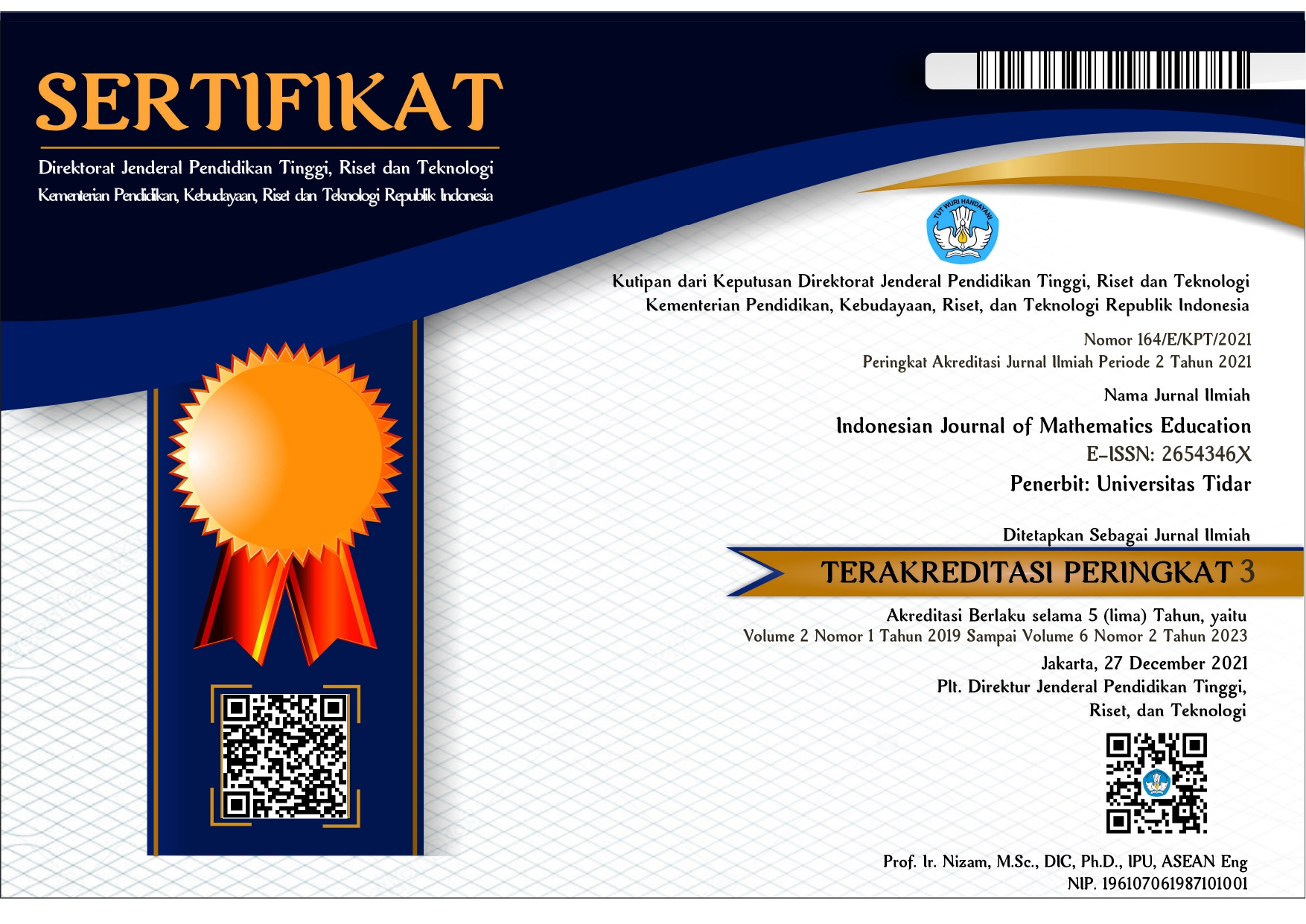Correlation between STEM Knowledge and STEM Teaching Practice: A Study of Mathematics Teachers' Professional Development
Keywords:
STEM, mathematics teachers' professional developmentAbstract
This research aims to investigate the relationship between mathematics teachers' knowledge of STEM (Science, Technology, Engineering, and Mathematics) education and their teaching practice in schools during a STEM professional development program. The study involved 34 Indonesian mathematics vocational high school teachers enrolled in the STEM professional development program. Tests and reports on STEM teaching practices served as data sources for this study. Our finding shows a positive correlation between mathematics teachers' STEM knowledge and how they facilitate STEM project-based learning for their students. We discuss two different points of view to interpret this result. Furthermore, we suggest the need for further research to develop sustainable efforts in strengthening the STEM education interdisciplinary approach for the professional development of mathematics teachers.
References
Ball, D. L., Thames, M. H., & Phelps, G. (2008). Content knowledge for teaching: What makes it special? Journal of Teacher Education, 59, 389–407. https://doi.org/10.1177/0022487108324554
Becker, K., & Park, K. (2011). Effects of integrative approaches among science , technology , engineering , and mathematics ( STEM ) subjects on students ’ learning : A preliminary meta-analysis. Journal of STEM Education, 12(5), 23–38. https://doi.org/10.1037/a0019454
Bergsten, C., & Frejd, P. (2019). Preparing pre-service mathematics teachers for STEM education: An analysis of lesson proposals. ZDM, 51, 941–953. https://doi.org/10.1007/s11858-019-01071-7
Berisha, F., & Vula, E. (2021). Developing pre-service teachers conceptualization of STEM and STEM pedagogical Practices. Frontiers in Education, 6(585075). https://doi.org/10.3389/feduc.2021.585075
Burrows, A. C., Borowczak, M., Myers, A., Schwortz, A. C., & McKim, C. (2021). Integrated STEM for teacher professional learning and development: “I Need Time for Practice.” Education Sciences, 11(21), 1–23. https://doi.org/10.3390/educsci11010021
Capraro, R. M., Capraro, M. M., & Morgan, J. R. (2013). STEM project-based learning an integrated science, technology, engineering, and mathematics (STEM) approach. In STEM Project-Based Learning an Integrated Science, Technology, Engineering, and Mathematics (STEM) Approach. https://doi.org/10.1007/978-94-6209-143-6
Chai, C. S., Rahmawati, Y., & Jong, M. S. Y. (2020). Indonesian science, mathematics, and engineering preservice teachers’ experiences in STEM-TPACK design-based learning. Sustainability, 12, 1–14. https://doi.org/10.3390/su12219050
Cleff, T. (2014). Exploratory Data Analysis in Business and Economics. Springer. https://doi.org/10.1007/978-3-319-01517-0
Dalby, D., & Noyes, A. (2015). Connecting mathematics teaching with vocational learning. Adult Learning Mathematics: An International Journal, 10(1), 40–49.
Deming, D. J., & Noray, K. (2020). Earnings dynamics, changing job skills, and stem careers. The Quarterly Journal of Economics, 135(4), 1965–2005. https://doi.org/10.1093/qje/qjaa021
Fraenkel, J. R., Wallen, N. E., & Hyun, H. H. (2012). How to design and evaluate research in education. McGraw Hill.
Gore, J., Lloyd, A., Smith, M., Bowe, J., Ellis, H., & Lubans, D. (2017). Effects of professional development on the quality of teaching: Results from a randomised controlled trial of Quality Teaching Rounds. Teaching and Teacher Education, 68, 99–113. https://doi.org/10.1016/j.tate.2017.08.007
Han, S., Yalvac, B., Capraro, M. M., & Capraro, R. M. (2015). In-service teachers’ implementation and understanding of STEM project based learning. Eurasia Journal of Mathematics, Science and Technology Education, 11(1), 63–76. https://doi.org/10.12973/eurasia.2015.1306a
Hasim, S. M., Rosli, R., Halim, L., Capraro, M. M., & Capraro, R. M. (2022). STEM professional development activities and their impact on teacher knowledge and instructional practices. Mathematics, 10(1109). https://doi.org/10.3390/math10071109
Jacob, R., Hill, H., & Corey, D. (2017). The impact of a professional development program on teachers’ mathematical knowledge for teaching, instruction, and student achievement. Journal of Research on Educational Effectiveness, 10(2), 379–407.
Kennedy, M. M. (2016). How does professional development improve teaching? Review of Educational Research, 20(10), 1–36. https://doi.org/10.3102/0034654315626800
Kristianti, R., Muchyidin, A., & Manfaat, B. (2022). Exploration of vocational school students’ misconceptions of circle material. Journal of General Education and Humanities, 1(2), 95–106. https://doi.org/https://doi.org/10.58421/gehu.v1i2.19
Luft, J. A., Diamond, J. M., White, C. Z., & Y., D. (2020). Research on K-12 stem professional development programs: An examination of program design and teacher knowledge and practice. In C. C. Johnson, M. J. Mohr-Schroeder, T. J. Moore, & L. D. English (Eds.), The Handbook of Research on STEM Education (pp. 361–374). Routledge.
Maass, K., Geiger, V., Ariza, M. R., & Goos, M. (2019). The role of mathematics in interdisciplinary STEM education. ZDM, 51(6), 869–884. https://doi.org/10.1007/s11858-019-01100-5
Marfuah, M. (2021). Embedding STEM in the mathematics classroom: A case study of vocational high school teacher’s practice. Journal of Physics: Conference Series, 1957(012028). https://doi.org/10.1088/1742-6596/1957/1/012028
Nugroho, O. F., Permanasari, A., & Firman, H. (2019). The movement of stem education in Indonesia: Science teachers’ perspectives. Jurnal Pendidikan IPA Indonesia, 8(3), 417–425. https://doi.org/10.15294/jpii.v8i3.19252
Parmin, P., Saregar, A., Deta, U. A., & El Islami, R. A. Z. (2020). Indonesian science teachers’ views on attitude, knowledge, and application of STEM. Journal for the Education of Gifted Young Scientists, 8(1), 17–31. https://doi.org/10.17478/jegys.647070
Santagata, R., & Lee, J. (2019). Mathematical knowledge for teaching and the mathematical quality of instruction: A study of novice elementary school teachers. Journal of Mathematics Teacher Education, 0123456789. https://doi.org/10.1007/s10857-019-09447-y
Sokolowski, A. (2018). Scientific inquiry in mathematics theory and practice: A STEM perspective. Springer International Publishing. https://doi.org/10.1007/978-3-319-89524-6
Stevenson, H. J. (2014). Myths and motives behind STEM. Issues in Teacher Education, 23(1), 133–146.
You, H. S., Chacko, S. M., & Kapila, V. (2021). Examining the effectiveness of a professional development program: Integration of educational robotics into science and mathematics curricula. Journal of Science Education and Technology, 30, 567–581. https://doi.org/10.1007/s10956-021-09903-6
Published
How to Cite
Issue
Section
Copyright (c) 2023 Indonesian Journal of Mathematics Education

This work is licensed under a Creative Commons Attribution-NonCommercial-ShareAlike 4.0 International License.









